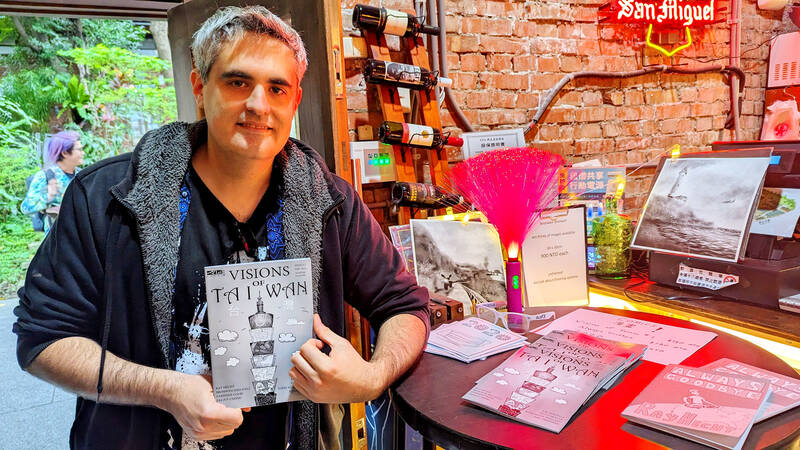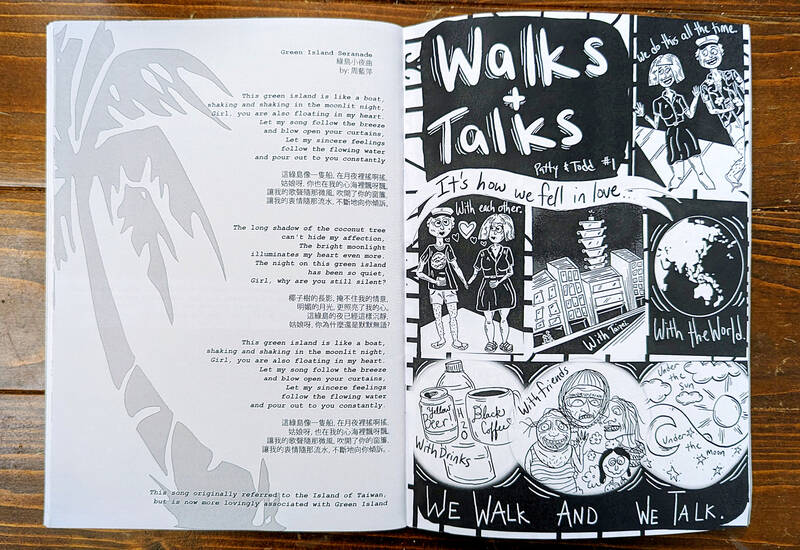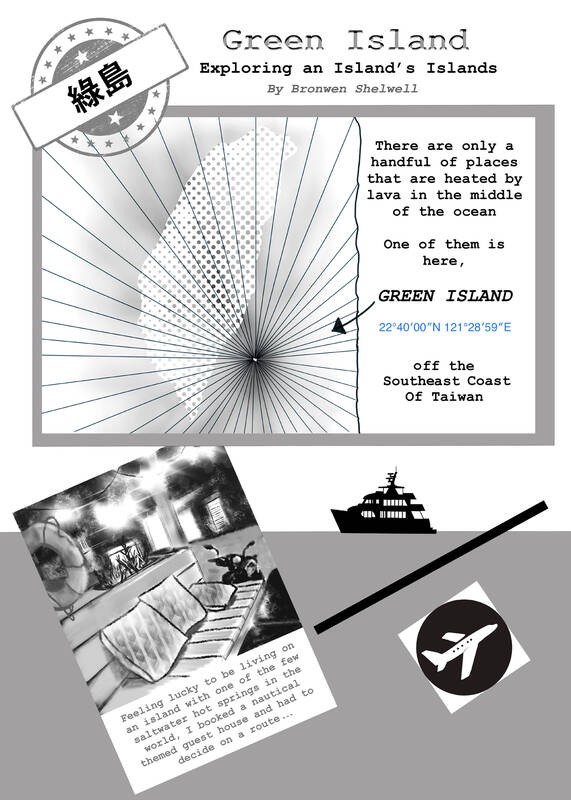One of Patty Hogan’s more memorable moments in Taiwan was watching a kid quickly eat an entire rice triangle with seaweed at 7-Eleven. He then puked it up.
“It was such a metaphor for life, art, consumerism, religion, politics and everything we love, but it was also really funny,” the American artist writes in her humorous piece “Walks and Talks” for the inaugural issue of Visions of Taiwan, an English-language comic anthology that celebrated its official release on Sunday.
Containing seven stories employing a wide range of graphic styles and voices, the focus of this black-and-white, 48-page issue is about the Taiwan experiences of the foreign creators — who hail from Malaysia, Canada, the US and South Africa. There are a few requisite “how I ended up in Taiwan” tales, but there are also stories on how to get your scooter’s license.

Photo: Han Cheung, Taipei Times
Although anthology editor Ray Hecht sees himself more of a writer, he’s been experimenting with graphic novels in the past few years, drawing inspiration from the indie spirit of eccentric American cartoonist Robert Crumb and the punk zine aesthetic. He published in 2019 the autobiographical Always Goodbye, and last year began approaching artists he’d met to contribute personal narratives to what became Visions of Taiwan.
“There was a bit of a learning curve. Some people are just artists rather than storytellers and writers,” Hecht says. “I really had to beg people to give me a short script first. You may have an image in your mind, but it doesn’t translate to the page very well until you have experience [with comics].”
Hecht’s contribution is about how he finally got his scooter license on the fourth attempt.

Photo: Han Cheung, Taipei Times
“Every time I went there I learned a new rule,” he says. “I kept failing and starting over until it consumed me, and it became my go-to story when people asked me what I’ve been up to lately,” he says.
Bronwen Shelwell, an international school art teacher from South Africa, depicted a trip to Green Island in her piece, which was more of a series of digital paintings rather than a conventional comic. A colleague saw her finishing the piece at the office and told her about the classic song Green Island Serenade (綠島小夜曲), which is translated into English at the end of the story.
“I think it’s a really nice first introduction on what Taiwan means to people,” she says.

Photo courtesy of Bronwen Shelwell
This issue was a lot about people’s various first experiences, but she hopes that they can delve deeper for the next one.
“What I love is that we all got stuck here due to COVID-19, so we all had to move past that first experience to a solid three years of living here and not going anywhere else,” she says. “Otherwise, it’s often a lot of new people arriving and telling that same story over and over, but now I think people have more to draw from.”
Hecht wanted the second issue to feature fictional narratives, but many contributors have said that they prefer to stick to the autobiographical.
“It can be creative nonfiction where you tell a true story within the structure of a fictional narrative. As people get more experienced, we’ll be able to do more,” he says.
Taiwanese voices are welcome too, he says, as long as they’re able to contribute in English. Hecht hopes to publish it twice a year.
So far, the book will be available at Vinyl Decision at Huashan 1914 Creative Park, Comic Trap (漫坑) in Ximending, the Red Room and through Amazon.

In Taiwan there are two economies: the shiny high tech export economy epitomized by Taiwan Semiconductor Manufacturing Co (TSMC, 台積電) and its outsized effect on global supply chains, and the domestic economy, driven by construction and powered by flows of gravel, sand and government contracts. The latter supports the former: we can have an economy without TSMC, but we can’t have one without construction. The labor shortage has heavily impacted public construction in Taiwan. For example, the first phase of the MRT Wanda Line in Taipei, originally slated for next year, has been pushed back to 2027. The government

July 22 to July 28 The Love River’s (愛河) four-decade run as the host of Kaohsiung’s annual dragon boat races came to an abrupt end in 1971 — the once pristine waterway had become too polluted. The 1970 event was infamous for the putrid stench permeating the air, exacerbated by contestants splashing water and sludge onto the shore and even the onlookers. The relocation of the festivities officially marked the “death” of the river, whose condition had rapidly deteriorated during the previous decade. The myriad factories upstream were only partly to blame; as Kaohsiung’s population boomed in the 1960s, all household

Allegations of corruption against three heavyweight politicians from the three major parties are big in the news now. On Wednesday, prosecutors indicted Hsinchu County Commissioner Yang Wen-ke (楊文科) of the Chinese Nationalist Party (KMT), a judgment is expected this week in the case involving Hsinchu Mayor Ann Kao (高虹安) of the Taiwan People’s Party (TPP) and former deputy premier and Taoyuan Mayor Cheng Wen-tsan (鄭文燦) of the Democratic Progressive Party (DPP) is being held incommunicado in prison. Unlike the other two cases, Cheng’s case has generated considerable speculation, rumors, suspicions and conspiracy theories from both the pan-blue and pan-green camps.

Stepping inside Waley Art (水谷藝術) in Taipei’s historic Wanhua District (萬華區) one leaves the motorcycle growl and air-conditioner purr of the street and enters a very different sonic realm. Speakers hiss, machines whir and objects chime from all five floors of the shophouse-turned- contemporary art gallery (including the basement). “It’s a bit of a metaphor, the stacking of gallery floors is like the layering of sounds,” observes Australian conceptual artist Samuel Beilby, whose audio installation HZ & Machinic Paragenesis occupies the ground floor of the gallery space. He’s not wrong. Put ‘em in a Box (我們把它都裝在一個盒子裡), which runs until Aug. 18, invites